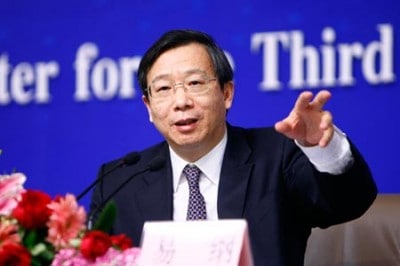Individual Chinese citizens could soon be allowed to invest as much as $1 million to $2 million overseas without regulatory approval, according to a statement by a deputy governor of the country’s central bank over the weekend.
The relaxation on international capital flows for individuals would follow similar moves for companies that have helped spark a surge in overseas investment by Chinese corporations that reached a record $84.4 billion last year, according to the Heritage Foundation.
Should the central bank follow through with concrete measures within the coming months it could provide wealthy Chinese with greater access to alternative investments beyond those available in China’s still underdeveloped financial markets, and fuel a further surge in overseas real estate investment by individuals
Foreign Exchange Watchdog Speaks Out
The potential for loosening controls on outbound capital flows was announced informally in Beijing on Saturday by Yi Gang, a deputy governor of the People’s Bank of China.
 Is this Yi Gang’s way of signalling that the new limit will be $2 million?
Is this Yi Gang’s way of signalling that the new limit will be $2 million?
When asked as part of a panel discussion at the China Development Forum whether China could allow individuals to send as much as $1 million to $2 million overseas, Yi replied that “I think that in the near future, we can consider an arrangement like that,” according to an account in Bloomberg.
Although the official’s remarks may appear casual, Chinese bureaucrats of Yi’s caliber seldom make substantive pronouncements of any magnitude without several levels of approval. Also, Yi’s position as Director of China’s State Administration of Foreign Exchange, which is in addition to his role with the PBOC, makes him one of the country’s most qualified individuals for commenting on foreign exchange policy.
In November last year Shanghai’s party chief announced that qualified individuals would soon be allowed to invest overseas directly without prior approval through the city’s free trade zone. The expansion of this privilege to the citizenship as a whole would fit a pattern of China using the special economic area to trial new policies that have often been quickly expanded nationwide.
China Allowing More International Capital Flows
Although no concrete plan has been laid out by the government for removing the existing rules that restrict individuals to bringing the equivalent of $50,000 per year into or out of the country, such a plan would fit with recent trends in China’s management of its capital accounts.
While the country has traditionally kept tight controls on capital flows into and out of the country, it has gradually been loosening these measures, starting with corporate accounts.
In late 2012, China began allowing its insurance companies, and later other corporates, to transfer at least part of their funds overseas without approval from the Ministry of Commerce.
The result of the relaxation of restrictions on investment by the country’s insurers has fueled a surge in overseas asset acquisitions that has seen Chinese insurance companies aggressively acquiring hotels and other real estate assets in New York, London, Sydney, and other cities.
Then in 2014, another regulatory body – the National Development and Reform Commission (NDRC) raised the ceiling on investments that would require its approval to $1 billion. Prior to that move, transactions for resource related investments of more than $300 million, or of more than $100 million in other industries, would have required NDRC approval.
By allowing corporations to more freely invest overseas, overseas investment in real estate by Chinese companies increased by 46 percent to a record $16.5 billion in 2014, according to JLL.
Creating More Investment Options for Wealthy Individuals
China began giving its private citizens greater access to overseas investments in a limited form last year, when it established the Shanghai-Hong Kong stock connect, that allows mainland individuals to purchase shares on the Hong Kong exchange, and vice-versa. There are plans for a similar link from Hong Kong to the Shenzhen exchange for later this year.
While the exact nature of any new rules will have to wade its way through China’s bureaucracy, the apparent decision to allow private individuals still greater access to international markets, seems to signal growing confidence in the stability of the nation’s capital markets.
By giving citizens the right to invest globally, China will also most likely remove some demand from its housing market, which had previously been seen as one of the most promising investment alternatives compared to the country’s casino-esque stock market or its close-to-zero-interest bank deposits.
New Rules Could Let Wealthy Chinese Invest Up to $2M Overseas
Tags: China’s bureaucracy, Chinese citizens, Chinese corporations, freely invest overseas, international capital flows, lternative investments, National Development and Reform Commission, NDRC, overseas investment, real estate investment, relaxation of restrictions
 Oxstones Investment Club™
Oxstones Investment Club™